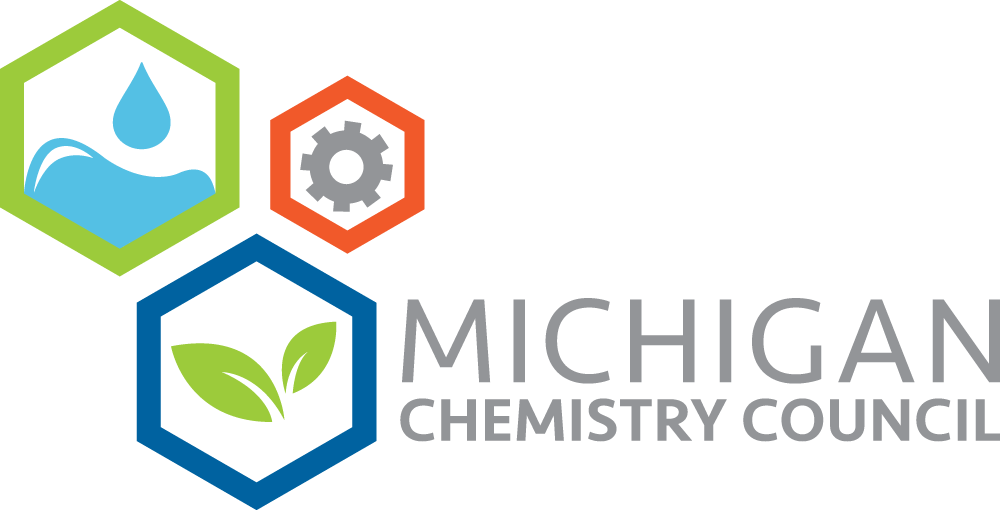Michigan Chemistry at Work and Meeting Local Needs During COVID-19

Over the past several weeks, the COVID-19 pandemic has stricken thousands of Michiganders and disrupted our typical way of life. During this time, our healthcare workers and first responders have devoted heroic efforts to providing care and protection at the front lines. Importantly as well, the business of chemistry is one of the critical sectors responding to the need for personal protective equipment (PPE), hand sanitizer and other medical supplies, and the essential everyday goods needed by Michigan households. Many of these goods have seen an unprecedented surge in use, straining supply chains to critical points.
Even before the coronavirus, chemistry has had a central role in providing clean water, medicines, personal care products, food, and packaging. Chemicals impact more than 96 percent of all manufactured goods and are a vital input to numerous supply chains. It’s safe to say that the economy and public health would not last long without chemistry products.
Because of this role, the chemical industry was recognized as “essential critical infrastructure” by the U.S. Department of Homeland Security and many states, including Michigan’s Governor Gretchen Whitmer. As such, chemical companies have continued production and distribution, even while instituting significant protective measures for their employees, including increased remote work, health screenings, social distancing protocols, staggered shifts, regular deep-cleaning, and enhanced PPE.
Across the country, companies such as DuPont (Tyvek) and 3M (filtering respirators) have dramatically boosted the production of these vital goods. Other in-demand products include isopropyl alcohol (for hand sanitizer), polypropylene (for N95 masks), hydrogen peroxide (for disinfectants), testing reagents, medical oxygen, and numerous materials for ventilators. Chemistry is similarly playing a major role in the early-stage development of COVID therapeutics and vaccines. Excitingly, Pfizer recently announced that it was starting clinical trials on a new mRNA-based COVID vaccine, with initial manufacturing of the vaccine to take place at its Kalamazoo site. This work to enable both basic necessities and life-sustaining innovation is at the heart of the chemical enterprise.
Here in Michigan, chemistry is hard at work against COVID-19. Neogen, which manufactures food safety products in Lansing, is increasing the production of sanitizers and disinfectants. Haviland Enterprises in Grand Rapids is quickly ramping up production of disinfecting products that are in high demand. SK Saran in Midland is filling large orders for its plastic barrier resin used to produce protective suits as well as food packaging. DuPont's Healthcare Industries Materials Site in Hemlock is delivering silicone-based materials used as lubricants for hypodermic needles, tubing for vaccine manufacturing, and components for respirator pumps and masks. Anderson Development Company in Adrian is meeting demands for its materials used in safety glasses.
Like others, MCC members have also significantly responded to meet crucial local needs. Amway in Ada launched “Project Light Speed” in mid-March to produce thousands of units of hand sanitizer for local community groups. At the same time, BASF in Wyandotte secured rapid federal approval for the production of over 8,000 gallons of sanitizer for donation to the Henry Ford Health System and other partners. Haviland Enterprises began small-scale production of hand sanitizer for local distribution in West Michigan, and later joined with a Plymouth-based business partner to greatly increase their collective production capacities. Webb Chemical in Muskegon Heights supplied necessary chemicals for the production of sanitizer by a neighboring distillery, while DuPont’s Hemlock site is providing purified water for the production of sanitizer by another local partner. Wacker Chemical in Adrian and Ann Arbor produced hand sanitizer for donation to local first responders and retirement communities. Needless to say, Michigan will be well-supplied with hand sanitizer due to the efforts of our state’s chemical supply chain!
Additionally, DuPont, Amway, and the Three Rivers Corporation each mobilized to produce protective face shields to local hospitals. Before these last few weeks, none of these firms made such products, but each has applied their expertise to answer local calls for help.
Last but not least, companies have given away their own supplies of personal protective equipment to meet urgent needs by local hospitals and first responders. Hemlock Semiconductor scoured its plant in Saginaw County and found more than 15,000 items - including masks, coveralls, gloves, and more - for donation to Covenant HealthCare. BASF’s sites in Wyandotte and Southfield have also donated surplus PPE, including masks, gloves, safety glasses, and suits. Anderson Development Company in Adrian donated safety glasses, gloves, suits, and N95 masks to their local first responders in Madison Township. Gage Products in Ferndale donated surplus N95 masks to a local hospital.
These recent efforts have highlighted a fact that is actually longstanding: chemistry is essential to our lives. Moreover, Michigan is fortunate to have so many leading companies that develop, produce, and distribute vital goods – goods that are vital for global supply chains in normal times, and goods that have been vital to our state’s COVID response during these hard times. The MCC has endeavored to support our members throughout these challenging times with regular updates from state government, so that our companies can remain focused on providing the essential products needed at this time. If our state’s chemical companies were ever taken for granted, the past few weeks have shown just how important these resources really are.
